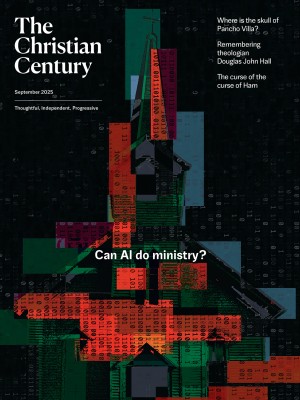Guestability
Churches tend to equate the notion of inclusion with hospitality. Peter and Cornelius suggest a more nuanced definition.

St. Peter Baptizing Cornelius, by Laurent Pécheux (Metropolitan Museum of Art, NY)
If you’re part of a progressive church, you find yourself talking a lot about inclusion. And inclusion seems even more significant right now, when the arc of history appears to have come adrift from what we thought was its inevitable tendency and started to bend elsewhere.
The Acts of the Apostles is a great text for those committed to inclusion, because it offers a series of studies in the ever-widening appreciation of the extent of God’s mercy—while admitting how challenging that can make things for the church. The story of Peter and Cornelius (Acts 10) is widely regarded as the definitive Christian story of inclusion. But this story presents a somewhat more nuanced notion of inclusion than we might normally encounter.
Read our latest issue or browse back issues.
Conventional inclusion rests on the notion of hospitality. It assumes that this is our territory, we play by our own rules, and our identity is normative. So if we host a party, it’s on our turf, we decide who’s invited, and we dictate when people go home. If someone arrives in a see-through outfit, starts using drugs, or looks like they’re about to throw up in the corner, it’s our call whether we ask them to leave. So what appears to be an act of generosity in being a host could be viewed more skeptically as a display of affluence and taste, an assertion of customs and norms, and a subtle statement of control. I’m not against hospitality; I’m just pointing out that that it may not be an adequate way of thinking about inclusion.
In the story from Acts, there’s some confusion over who’s the host. Peter’s the Jew, so he’s at home. But the land is occupied and controlled by Rome, and Cornelius is a Roman centurion. Peter’s the Christian, so he gets to decide who’s in the church and who isn’t. But Cornelius is the one who’s seen the angel and heard God speak. And Cornelius is the host whose messengers bring Peter to Caesarea, a name that suggests we’re subtly talking about Rome.
This isn’t an account of benevolent and magnanimous Peter widening his inclusion to embrace the unclean enemy Cornelius. It’s a story that transforms the whole dynamics of belonging.
I don’t think the English language has a word for the notion of inclusion at play here. I’ve heard it characterized as cultural intelligence, or CQ, which refers to the ability to adapt and flourish in diverse cultural settings. But that still suggests that one retains the initiative. What if we called it not hospitality but guestability? Guestability means the grace and receptivity to act generously in other people’s territory. It means setting aside the privileges of being the host and being willing and available to accommodate and adapt, to learn and appreciate. When you stay in someone else’s house, you might bring a gift, ask what’s a suitable time to get up, take an interest in your host’s furniture, express gratitude for their cooking, and try to penetrate the mysteries of their dishwasher or recycling system.
What the story of Cornelius and Peter challenges the church to do is to change its default setting from hospitality to guestability. Peter is in Cornelius’s home. He’s receptive to Cornelius’s breathtaking experience of the Holy Spirit. He’s realizing there’s a whole dimension of God that he and his tradition haven’t previously encompassed. He’s not including Cornelius in something that belongs to him; he’s recognizing that the Holy Spirit is inviting both him and Cornelius into something beyond both of them.
The word inclusion, as we typically use it, is in the end an inadequate and subtly controlling one. A better term might be common discovery—something we more readily appreciate when we’re away from our own familiar territory. It’s not, “You can belong in my club because I’m generous.” It’s, “Being with you is showing me there’s something beyond us both, toward which we’re each heading, and to which I’m realizing you’re in many ways closer than I am. Let’s make our way there together.”
This is the moment of conversion—not Cornelius’s but Peter’s and ours. Christianity stops being our entitled possession and becomes God’s astonishing invitation. It turns out we don’t get to hand out the invites, and the opportunity isn’t to become like us; it’s to become God’s companions. The Holy Spirit is constantly bursting open our narrow understandings of who belongs and what the rules are. We’re being transformed from weary, entitled hosts to excited and grateful guests.
How do we learn to become guestable? By beholding Jesus, who asks us to meet him not in his territory but in the incarnation, which comes to ours. He exercises guestability by eating with us, sharing our life, abiding with us, and belonging with us. In him the whole distinction between who is guest and who is host—whose territory this really is—becomes hopelessly and gloriously confused.
And the moment we realize this, we trespass into a host of discoveries. We’re no longer fiercely controlling and patrolling the parameters of holiness and belonging but deliriously discovering the wondrous surprises of the Holy Spirit’s unfolding celebration. The world isn’t ours. The church isn’t ours. Our lives aren’t ours. All hospitality is in the end an illusion, a social construction to make us feel proprietorial and in control. Our life in every precious moment is a priceless gift; the world is a dazzling theater of wonder. The church isn’t an enclave whose boundaries we patrol; it’s a dynamic meeting place where we’re all guests and we’re all discovering and everyone’s en route to something ever more fabulous.







